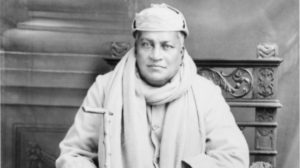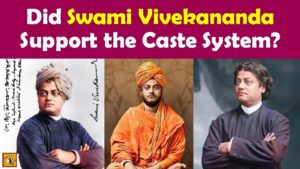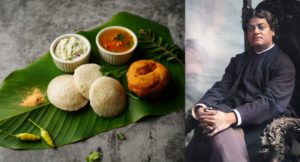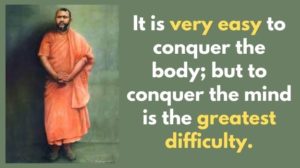This article has been authored by Durga Prasad, an ardent devotee of Swami Vivekananda.
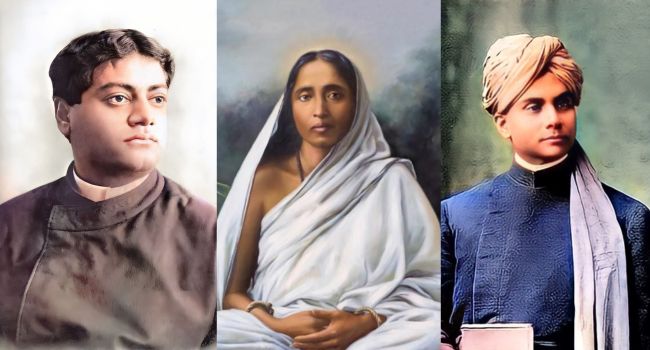
In this second article I share more information that I gathered while I was exploring Swami Vivekananda’s stance on diet.
As you know, in those times, many places in the West experienced harsh and cold climates, leading to challenging living conditions for the people residing there. The colder weather often brought shorter growing seasons and also limited agricultural productivity.
I observed the following in the works of Swami Abhedananda, who was also a direct disciple of Sri Ramakrishna, just like Swami Vivekananda.
In a letter to Swami Vivekananda, He mentions:
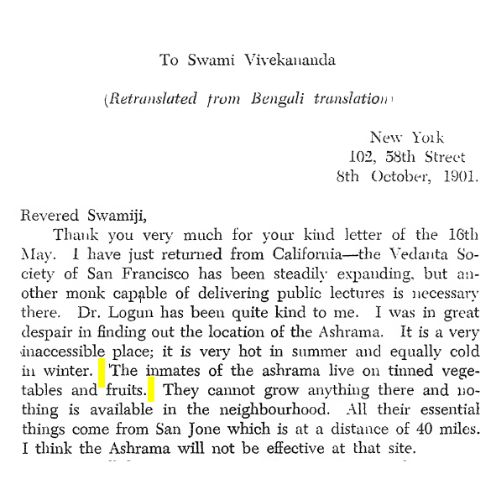
Revered Swamiji, I have just returned from California. The Vedanta Society of San Francisco has been steadily expanding…(but) the Ashrama is in a very inaccessible place. It is very hot in summer and equally cold in winter.
The inmates of the Ashrama lived on tinned vegetables and fruits. They cannot grow anything there and nothing is available in the neighbourhood. All essential things come from San Jone which is at a distance of 40 miles.
– Complete Works of Swami Abhedananda, Volume 10, page 106
During those days, Swami Abhedananda followed a strict vegetarian diet which led to health issues sometimes. There is also a letter from Maa Sarada (who was none other than Maa Sita herself) where she advised him not to be very strict on vegetarian food and to take care of his health.
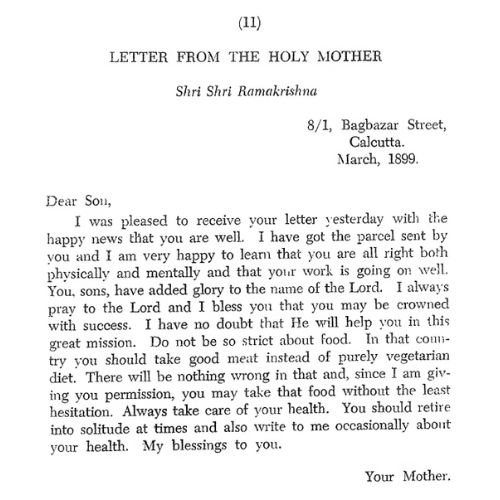
Do not be so strict about food. In that country you should take good meat instead of purely vegetarian diet. There will be nothing wrong in that, and since I am giving permission, you may take the food without the least hesitation. Always take care of your health.
– Maa Sarada to Swami Abhedananda, Complete Works of Swami Abhedananda, Volume 10, page 111
Thus while living in inhospitable conditions when nutritious vegetarian food was not available, Maa Sarada gave permission to Swami Abhedananda to eat non vegetarian food.
Like Swami Abhedananda, Swami Vivekananda too preferred a vegetarian diet when available. We can observe Swami Vivekananda’s preference in his letters-
” Well, I am a vegetarian . . ., because I prefer it when I can get it.”
– Complete Works of Swami Vivekananda, Volume 7
“PS. Kindly order some vegetables for me. I don’t care much for rice — bread will do as well. I have become an awful vegetarian now.”
– Complete Works of Swami Vivekananda, Volume 8
“I am getting plenty of vegetables cooked, you will be surprised to hear, à la Indienne perfectly. When an Englishman takes up a thing, he goes to its very depths.”
– Complete Works of Swami Vivekananda, Volume 6
He also taught the preparation of vegetable curry to his disciple. This was mentioned by Swami Abhedananda:
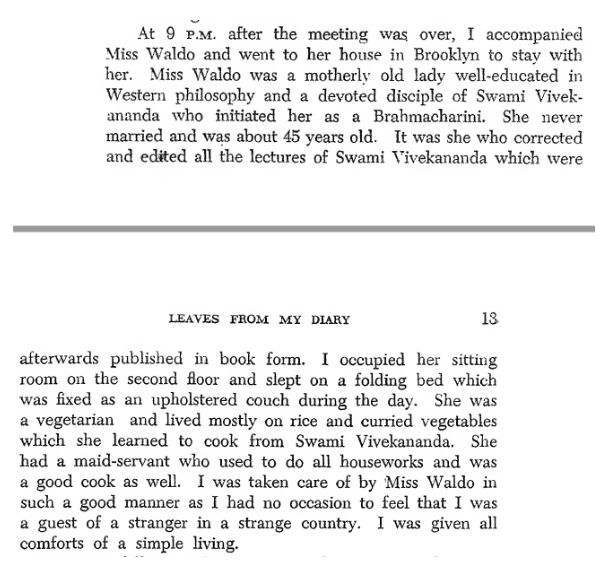
– Swami Abhedananda
Although, under certain circumstances he was bound to eat meat, he didn’t justify it by bringing down the ideal-
“I myself may not be a very strict vegetarian, but I understand the ideal. When I eat meat I know it is wrong. Even if I am bound to eat it under certain circumstances, I know it is cruel.
I must not drag my ideal down to the actual and apologise for my weak conduct in this way. The ideal is not to eat flesh, not to injure any being, for all animals are my brothers. If you can think of them as your brothers, you have made a little headway towards the brotherhood of all souls, not to speak of the brotherhood of man! That is child’s play.”
– Complete Works of Swami Vivekananda, Volume 2
There is one more incident from Swami Vivekananda’s life as a Parivrajaka (wandering monk):
Once it occurred to the Swami, in the course of his itineracy, that going from place to place and begging for food from door to door was after all not the aim of his life for the realisation of which he had renounced his home.
In a letter written about this time to one of his brother-disciples he says with great depression, “I am going about taking food at others’ houses shamelessly and without the least compunction like a crow.” He thought, “Let me beg no longer! What benefit is it to the poor to feed me? If they can save a handful of rice, they can feed their own children with it.
Anyway, what is the use of sustaining this body if I cannot realise God?” A desperate ascetic mood came upon him, and a terrible spiritual dissatisfaction overwhelmed him, as sometimes occurs with great mystics, and he determined in a moment of supreme despair to plunge into a dense forest and, like some great Rishi of old, let the body drop from sheer starvation and exhaustion.
Thereupon he entered into a thick forest which stretched for miles and miles before him, and walked the whole day without a morsel of food. The evening approached. He was faint from fatigue and sank to the ground beneath a tree, fixing his mind upon the Lord, his eyes looking vacantly in the distance.
After some time he saw a tiger approaching. Nearer and nearer it came. Then it sat down at some distance from him. The Swami thought, “Ah! This is right, both of us are hungry. After all, this body has not been the vehicle for absolute realisation, and as by it no good to the world will possibly be done, it is well and desirable that it should be of service at least to this hungry beast.”
He was lying there all the while calm and motionless, waiting every moment for the tiger to pounce upon him, but for some reason or other the animal ran off in another direction. The Swami, however, thought that it might yet return and waited, but the tiger did not come.
He spent the night in the jungle beneath the shelter of the tree, holding communion with his own soul. And with the approach of dawn, pondering in the silence of that forest on the guiding Providence of the Most High, a great sense of power came upon him. The full contents of this experience were known only to himself.
– Swami Vivekananda: A Biography By His Eastern and Western Disciples
Despite multiple challenges that he faced in his divine mission, there were orthodox hindus who used to criticize him for going abroad, dining with mlechhas (foreigners) etc. without providing an ounce of help from their side. Swami Vivekananda was frustrated with this and he writes:
If the people in India want me to keep strictly to my Hindu diet, please tell them to send me a cook and money enough to keep him. This silly bossism without a mite of real help makes me laugh.
– Complete Works of Swami Vivekananda, Volume 5
As an ending note, according to some traditions, Buddha himself never insisted on his monks living on vegetables only—he permitted them to take meat.
“In the Jivaka Sutta, Buddha instructs a monk or nun to accept, without any discrimination, whatever alms food is offered with good will, including meat.
On one particular occasion, he specifically refused suggestions by Devadatta to institute vegetarianism in the Sangha.
In the Amagandha Sutta in the Sutta Nipata, a vegetarian Brahmin confronts Kassapa Buddha (a previous Buddha before Gautama Buddha) in regard to the evil of eating meat. The Brahmin insisted his higher status is well-deserved due to his observance of a vegetarian diet.
The Buddha countered the argument by listing acts which cause real moral defilement (i.e. those acts in opposition to Buddhist ethics) and then stating the mere consumption of meat is not equivalent to those acts.
– Reference: Wikipedia on Buddhist vegetarianism
Conclusion by Pulkit
So to summarize diet depends on time, situation and circumstances. Today, if we can be vegetarian, we absolutely should. Science has rapidly advanced. Several vitamins, crucial to the body’s functioning, which are not found in vegetarian food are easily available in supplement form. Furthermore, if there is a scarcity of pulses (a crucial source of protein) in India, we can import them from Canada and other nations.
Such advances in global trade, agriculture & health which make vegetarianism possible for larger and larger numbers of people, were not there a 100 years ago when Swamiji lived. Therefore we really are not qualified to judge his decisions.
We must keep in mind that circumstances determine diet and these circumstances can always change. If tomorrow the planet suddenly cools and an ice age descends – crop cultivation becomes impossible for half the year; or there is a biological attack which wipes out crops across the nation; or if there is widespread famine and lack of water for cultivation; then the moral rules we are applying towards eating purely vegetarian food will certainly change. So what we eat is determined by the times and circumstances we live in. The same rule cannot be blindly imposed in all situations and circumstances.
![]() Part 1: Why did Swami Vivekananda Teach Us to be Non-vegetarian if he Believed in Oneness?
Part 1: Why did Swami Vivekananda Teach Us to be Non-vegetarian if he Believed in Oneness?
Uplift your consciousness! Receive daily spiritual quotes from great Rishis. Subscribe to the Spiritual Bee’s broadcast on WhatsApp.



